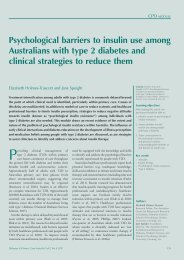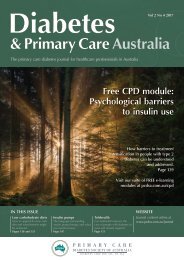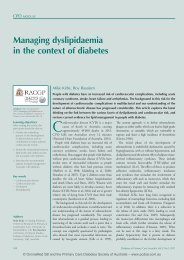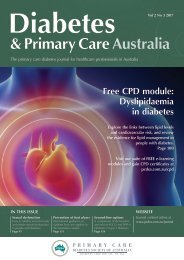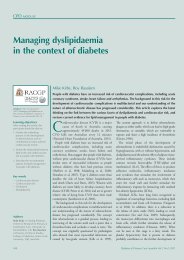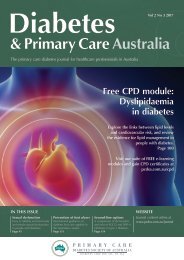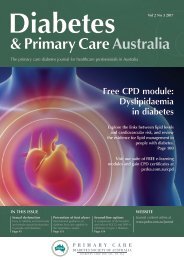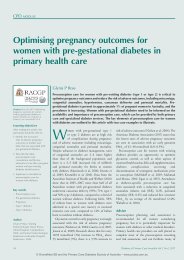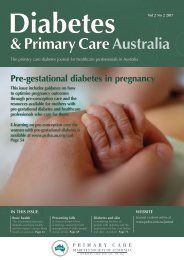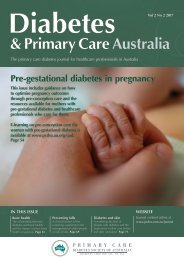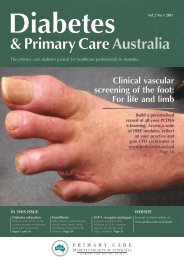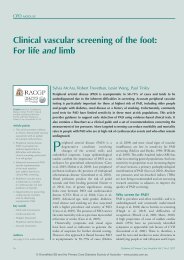DPCA2-2_issue_v3
You also want an ePaper? Increase the reach of your titles
YUMPU automatically turns print PDFs into web optimized ePapers that Google loves.
From the other side of the desk<br />
“As a person with<br />
diabetes, my advice<br />
to the medical world<br />
would be to consider<br />
the person in front<br />
of you without their<br />
diabetes diagnosis.”<br />
champion of the tests. It was an intense time but<br />
my motivation to have healthy babies drove me<br />
to that perfection, and I went on to have three<br />
babies in 3 years. I told the medical team what they<br />
wanted to hear, but this time I wasn’t lying.<br />
It became my obsession to get the numbers<br />
right. Averaging about 12–14 blood sugars daily<br />
and the never-ending specialist appointments were<br />
vital to achieving the desired outcome. I was lucky<br />
that the care I received from my diabetes team<br />
during my pregnancies was excellent and well<br />
planned. I feel that it is vital to have a trusting<br />
relationship with an endocrinologist before, during<br />
and after pregnancies, and I was very fortunate<br />
to have that. But pregnancy with diabetes is not<br />
without its difficulties; the severe hypos during the<br />
first trimesters became frequent and increasingly<br />
exhausting, and with every pregnancy, I had<br />
another toddler to care for. My first-born was<br />
diagnosed with cerebral palsy (totally unrelated<br />
to my diabetes), and as if that was not sufficiently<br />
challenging, I became a single Mum when my<br />
youngest was 11 months old. Juggling three<br />
toddlers, a part-time job to survive financially and<br />
my diabetes became routine. The all-or-nothing<br />
personality has some advantages and in those<br />
3 years, I was switched to “all”, determined to be<br />
a good Mum.<br />
However, as the years went by, I let those<br />
numbers slip again. My three gorgeous children,<br />
my world, were growing up fast, and at aged 6, 7<br />
and 8 years, they kept me busy. I kept the medical<br />
team at length – I knew I wasn’t going to “pass the<br />
test”. My 7-year-old daughter, Presley, had spirit<br />
(sometimes too much!) and when she came down<br />
with a viral illness, as a mum with diabetes would,<br />
I checked her blood sugar. My Mum had suggested<br />
the “D” word as Presley kept sleeping through the<br />
day, which was very much unlike her. I still recall<br />
that moment, and I think I too knew something<br />
wasn’t right. Weeks later, Presley mentioned to me<br />
that she was waking through the night to go to the<br />
bathroom. I knew. I waited.<br />
My beautiful girl was dressed in her swimmers<br />
ready to go swimming. I did her blood sugar and<br />
there I was – the mother of a child with diabetes.<br />
Now it was me answering the questions not as a<br />
person with diabetes, but as a Mum. It was more<br />
than my own tests – I had to pass all of Presley’s<br />
tests as well.<br />
I felt my skills as a parent were put under the<br />
microscope. I believed it was all my fault if her<br />
numbers weren’t right. What was she eating when<br />
I wasn’t there? Was she exerting too much energy<br />
during lunchtime at school? Could she recognise<br />
a hypo? I felt like I had to live in her head, and<br />
I became the “helicopter” Mum. Presley too<br />
hated the medical world, clamming up at all the<br />
questions and hating the scales and numbers. At<br />
home, she dealt with the never-ending motherly<br />
concerns and requests to check her blood sugar,<br />
blaming every ailment or headache on diabetes,<br />
whether or not it was.<br />
Where I am now<br />
Despite some complications of my own, at 44 years<br />
of age, I now take care of myself and feel as well as<br />
I can feel, given my past “bad behaviour”. I have<br />
a good relationship with my team and appreciate<br />
the rapport I have with them, which has taken<br />
many years to establish and develop. I now take<br />
charge of my appointments and we talk about the<br />
concerns I have. The first questions asked are not<br />
“shall we look at the numbers?” or “how many<br />
highs/lows are you having?”; rather, “how are you,<br />
and what’s going on in your world?”<br />
I have had a lovely relationship with my<br />
psychologist who somehow allows me to be proud<br />
of who I am and what I have achieved. I am now<br />
free of the judgement calls that I thought were<br />
placed on me as a person with diabetes and then<br />
as the mother of a child with diabetes. Mistakes<br />
are human. Rough patches enable us all to make<br />
better choices, and experience allows us to call the<br />
shots. It’s OK not to be perfect. I truly hope that<br />
if anything, I can pass this on to my children and<br />
that they reach this point a whole lot sooner than<br />
I did.<br />
As a person with diabetes, my advice to the<br />
medical world would be to consider the person<br />
in front of you without their diabetes diagnosis.<br />
Diabetes management is far more than looking<br />
at the numbers. Consider their state of mind<br />
and the unsaid pressures they may have put on<br />
themselves. The bravest thing one can do is to ask<br />
for help and say that we’re not OK, and creating<br />
an environment where people with diabetes feel<br />
comfortable and safe to do so is vital. n<br />
48 Diabetes & Primary Care Australia Vol 2 No 2 2017



